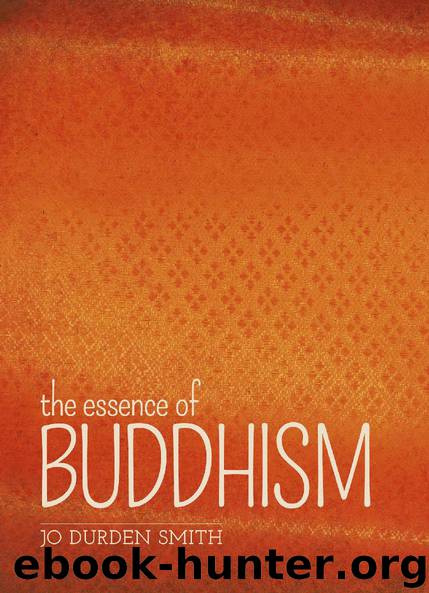The Essence of BUDDHISM by Jo Durden Smith

Author:Jo Durden Smith
Language: eng
Format: epub
Publisher: Arcturus Publishing Limited
Published: 2017-10-11T00:00:00+00:00
Compassion and the Six Perfections
In the early period, it was the wisdom of the arhants – their complete understanding of life and of ultimate reality – that had been the paramount virtue. Wisdom, however, maintained the Mahayanists, could be, and was indeed being, turned to ends that were selfish. In fact, there was nothing in wisdom alone that required it to be used to help others. Only when it was combined with infinite compassion could the stain of selfishness – and, therefore, self-centredness – be avoided. As in the end the only truly unselfish entities were Buddhas – who were both all-wise and all-compassionate – theirs was the path to be followed in an unselfish quest for enlightenment. The way of the bodhisattva became known as ‘the Buddha-Vehicle’, a word that was more or less interchangeable with the word Mahayana.
Following it, however, was, and is, no easy task, for it requires a very precise balance – a marriage of equals, indeed – between wisdom and compassion. (It also requires countless lives and aeons of time.) Compassion – empathy with the suffering of the world and a desire to rescue all living things from it – is vital to the decision to keep on postponing entrance into the bliss of nirvana and to continue being reborn; and wisdom is essential to a deeper and deeper understanding, through successive lives, of the emptiness ( sanyata ) of all there is. Compassion is necessary if the bodhisattva is to identify with all living things and share their passions, as he must, even though wisdom reveals again and again that they, their passions and their travails are equally illusory and fictitious. Finally, the bodhisattva, who is only separated from Buddhahood in the end by his clinging and contaminating belief that he somehow remains a separate individual, has to learn to obliterate himself completely – and for this too both compassion and wisdom are required. Compassion to enable the loss of self through sacrifice and service and wisdom to tear through the veils to ultimate reality and the ‘own-ness’ or ‘is-ness’ of all things.
According to Richard Robinson and Willard Johnson in their The Buddhist Religion, A Historical Introduction, the bodhisattva path begins
with instruction from a Buddha, a bodhisattva or some other spiritual friend. Seeds of virtue are planted in the mind of the hearers, and from much hearing they come to perform good deeds, through which they acquire more and more roots of goodness. After many lives, thanks to the infused grace of the various teacher-saviours and the merit earned by responding to them, a person becomes able to to put forth the bodhicitta (‘thought of enlightenment’). The two motives for this aspiration are one’s own desire for bodhi and compassion for all living beings who suffer in samsara. Initially the motivation is both egotistic and altruistic, but along the path one realizes the sameness of self and others, and transcends the duality of purpose … ‘Arousing the thought of enlightenment’ is a decisive conversion experience with profound psychological effects.
Download
This site does not store any files on its server. We only index and link to content provided by other sites. Please contact the content providers to delete copyright contents if any and email us, we'll remove relevant links or contents immediately.
The Way of Zen by Alan W. Watts(6614)
Ego Is the Enemy by Ryan Holiday(5448)
The Art of Happiness by The Dalai Lama(4130)
The Book of Joy by Dalai Lama(3986)
Why Buddhism is True by Robert Wright(3452)
Spark Joy by Marie Kondo(3302)
Shift into Freedom by Loch Kelly(3199)
Happiness by Matthieu Ricard(3047)
A Monk's Guide to a Clean House and Mind by Shoukei Matsumoto(2915)
The Lost Art of Good Conversation by Sakyong Mipham(2654)
The Meaning of the Library by unknow(2571)
The Unfettered Mind: Writings from a Zen Master to a Master Swordsman by Takuan Soho(2311)
The Third Eye by T. Lobsang Rampa(2266)
Anthology by T J(2213)
Red Shambhala by Andrei Znamenski(2199)
The Diamond Cutter by Geshe Michael Roach(2061)
Thoughts Without A Thinker: Psychotherapy from a Buddhist Perspective by Epstein Mark(2025)
Twilight of Idols and Anti-Christ by Friedrich Nietzsche(1894)
Advice Not Given by Mark Epstein(1880)
